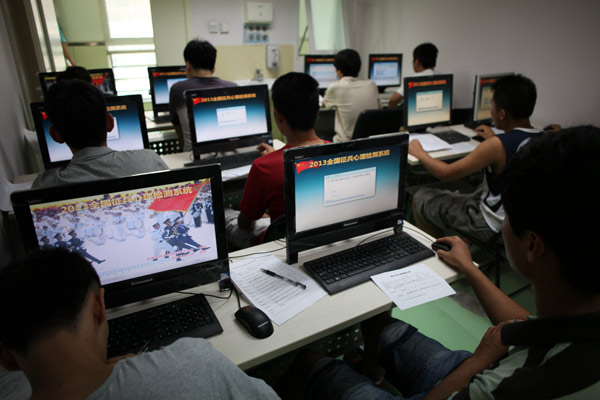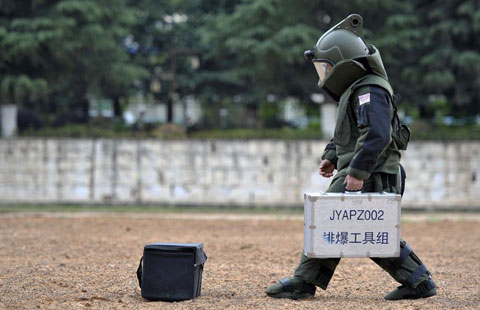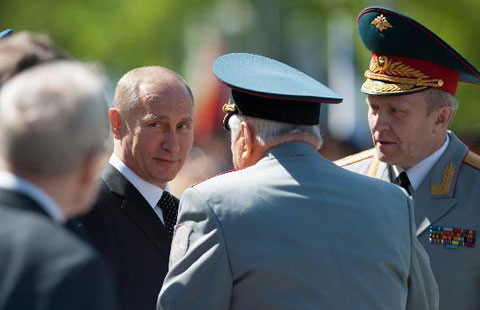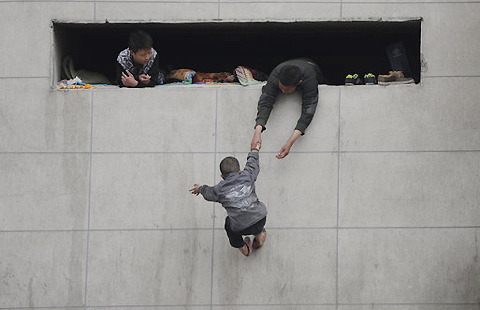Get ready for roll call
By Zhao Shengnan ( China Daily ) Updated: 2013-08-19 07:22:29
 |
|
Students take a psychological test in Beijing during the summer and autumn recruitment program. Wang Jing / China Daily |
Under the recruitment program, an increasing number of well-trained collegian veterans are becoming an elite group in local government, the civil service, non-public enterprises and other fields, according to the recruitment officer.
While many of the enlisted "post-90s" generation have decided to serve in the army for as long as possible, they also expect to gain more.
Zhang Chenyu wants to start a business serving the agricultural sector when he leaves the army. "I am not fully prepared for this undertaking at present, so I hope to grow into a hard-working and mature man by serving in the army," said the biological sciences major.
Tan Xiaotong, 24, who joined up in 2008, ticked off a list of goals before he left the army in 2010. "Collegian soldiers are expected to attain higher standards. Any fault can be attributed to your 'arrogance' as college students," said the recent Renmin University of China graduate.
Tan wanted to be a reconnaissance scout, but was originally assigned to a communications regiment. He won an opportunity to transfer to the reconnaissance regiment a year later, but the decision wasn't an easy one.
"My companions didn't understand my choice, since the awards I won in my first year of service might end up being worthless. I was also concerned about whether I could win the 'Excellent Soldier' award, which would mean I would be exempt from the written exams in the graduate entrance tests," he said, adding that he stuck with his original plan and became a reconnaissance scout.
The regiment Tan served in is renowned for its tough training, but the experience taught him, "What you plant now, you will harvest later." He was awarded third-class merits for excellence during his second year of service.
"The good habits I developed in the army, such as close attention to detail, still benefit me today," he added.
His outstanding military performance has given him an opportunity to become a graduate student at Renmin University of China without having to take an entrance examination. However, he has volunteered to spend a year as a teacher in a remote village in Southwest China's Sichuan province before returning to his studies.
"I think the two years I spent in the army influenced that decision," he said.
Mutual benefits
The growing number of enlisted college students has set a higher bar for the military authorities.
According to the recruitment officer, college students like to challenge authority occasionally. "It's not a fault to express those ideas," he said, "Because collegian soldiers enjoy a higher level of education than some of their supervisors, they are helpful in making the regime less harsh for regular soldiers."
Tan mentioned one of the changes he witnessed. "At one time, soldiers who failed to correctly fold their bedclothes into a square were forced to practice the procedure on the floor. However, the government has now done away with punishments of that sort," he said.
The army also made it possible for Tan to utilize the military knowledge he had gained as an amateur enthusiast. "Once I kitted myself out as a member of the Navy Seals, the US Navy's principal special operations force, during a field battle game and I am well versed in the use of such equipment," he said.
Tan also established direct communication with experts at munitions factories, something the 30 experienced soldiers in his unit failed to do. He was also designated to instruct an entire division in the operation of the latest weaponry and compile a series of pamphlets introducing China's most advanced military equipment.
Wang Guoben believes that obeying orders should be the top priority once a person enlists, and a college education should never be an excuse to complain about the training or to make extra demands.
"I plan to challenge my limits during my military life, because you never know what you can do until you try. These experiences will help me to discover what I really want from life," he said.
If he becomes a soldier, Wang will no longer be allowed to sport the hairstyles created by his favorite barber, but he seemed relaxed about that: "Well, it looks as though I will have to forget about fashion for the next two years," he smiled.
Contact the writer at zhaoshengnan@chinadaily.com.cn
Mo Jingxi contributed to this story.
- Students fail army fitness standards
- College student recruits in Beijing get exams
- College graduates encouraged to join military
- China to start military recruitment
- Official calls for continued improvement in military recruitment
- Military recruitment starts in Pingtan
- Beijing begins college students military recruitment
|
|
|
|
|
|
|
|


















 Op Rana
Op Rana Berlin Fang
Berlin Fang Zhu Yuan
Zhu Yuan Huang Xiangyang
Huang Xiangyang Chen Weihua
Chen Weihua Liu Shinan
Liu Shinan